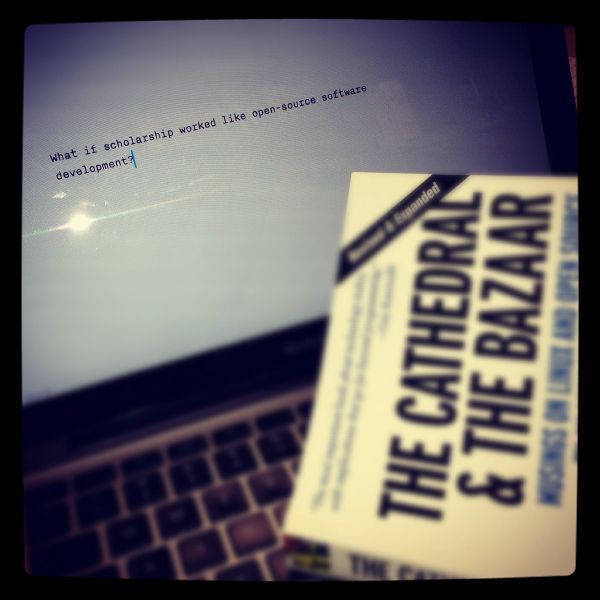I have never written a textbook. That said, I have some idea about the process as it has been traditionally practiced by the academy for dozens, if not hundreds of years. While we academics — I’m speaking from the subject position of an English professor — often have radical theoretical ideas, the way we have formally gone about expressing them is the epitome of conservatism. It goes something like this.
Scholars spend much of their lives researching an idea. In the beginning, they research what Those Who Came Before said about that idea. Hopefully, the scholar will eventually develop a new and often nuanced take on the idea and spend further time writing it down in a way that the local chapter of Those Who Came Before (or Those Who Guard the Door) will find acceptable and maybe even pleasing. If this is the case, the initiate is granted a title and is let into Club Academic. This is when the real work begins.

The newly minted Ph.D. will then try to find a place in the Scholarly Community as a practicing academic — a task that seems to get more difficult as the years pass. If successful, the Assistant Professors must prove to their colleagues (a new set of Those Who Guard) that they are worthy to breathe the same air. More often than not, this will include some form of formal participation in the highest echelon of Club Academic: publication. As with everything else in this hierarchal fellowship, there are various levels of participation here, but the highest is the monograph published by a University Press.
Here is when the junior scholar spends years developing an idea and writing it down in a way so that it will pass the muster of the “peer review.” If this happens — and it never does the first time — it is awarded the prize of publication. This prize often takes years to procure, since it is guarded fiercely by the guild of Those Who Came Before, or those aforementioned “peers.” By this time, the topic might be woefully out of date; monographs often taking years to see print. I know, too, that in English Studies irrelevance is rarely an issue, but I have often wondered who even reads many of the arcane and specialized volumes about the minutiae of prosody in, say, the odes of Tennyson. (No disrespect to Tenny or Those Who Study That.)
Perhaps this sort of guarding-the-entrance approach serves many disciplines well. Scholarship is conservative for a reason: it takes time and careful consideration to hone an idea so that it becomes worthy of entering the canon of published knowledge. After all, not all ideas are worthy, nor should they be. The academic hierarchy guarantees that only the best ideas get through. Yet, like other modernist, centralized systems that reigned during the Analog Age, perhaps “scholarship” will need to be revised in the face of the digital, especially if Laurie Burruss is correct in her assertion that “textbooks are dead.”[1]
In The Cathedral and the Bazaar, Eric S. Raymond discusses an analogous situation in software development. In this famous essay, Raymond argues that the open-source software movement — the “bazaar” — shattered the accepted idea that software needed to be developed by an elite few behind impenetrable walls — the “cathedral.”[2] Sound familiar? The cathedral is the proprietary model of software development: source code was written by “individual wizards or small bands of mages working in splendid isolation” and releasing compiled software only when it was deemed ready.[3] In contrast, the bazaar releases early and often to as many developers as possible. The idea here is that the more eyes on and approaches to the software builds a better and more community-centered product.
If this works with software, why not scholarship?
I’m not talking about Wikipedia here, though that is a model of open-source knowledge and perhaps one of the most successful Big (Digital) Humanities projects ever attempted. What I’m interested in is producing an open-source textbook that is released early and often. Why can’t a book about writing — especially a text book — have versions like software? Why not release a public beta and solicit feedback, like Walter Isaacson did recently?[4] Why not release versions that are not perfect, but are working toward it? Why not release an unfinished text that could benefit from the needs of the community who will use it? After all, we don’t have the financial constraints that plagued the publishing company when the only medium was ink on dead trees. Bits are cheap and infinite.
Another benefit to me is that I’m already tenured, so I have the flexibility to take a risk with this sort of project. It will likely be a while until open-source scholarship catches on in an official way, if it ever does. Perhaps it never will for the almighty monograph. Maybe that’s good?
For now, I’m going to concentrate on writing that textbook. More details about this project shortly. If you know of any resources for this idea, please let me know on Twitter.
references
- ↑ Burruss, Laurie (December 19, 2013). "A Look Ahead". EdTech Digest. Retrieved 2019-06-16.
- ↑ Raymond, Eric S. (2001). The Cathedral and the Bazaar. Cambridge: O'Reilly. pp. 21–22.
- ↑ Raymond 2001, p. 21.
- ↑ Isaacson, Walter (December 20, 2013). "The Culture That Gave Birth to the Personal Computer". Medium. Archived from the original on February 21, 2014. Retrieved 2014-07-11.
